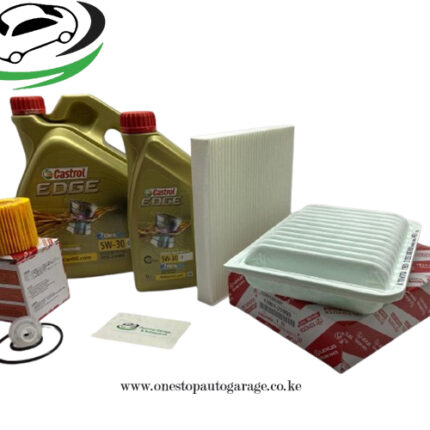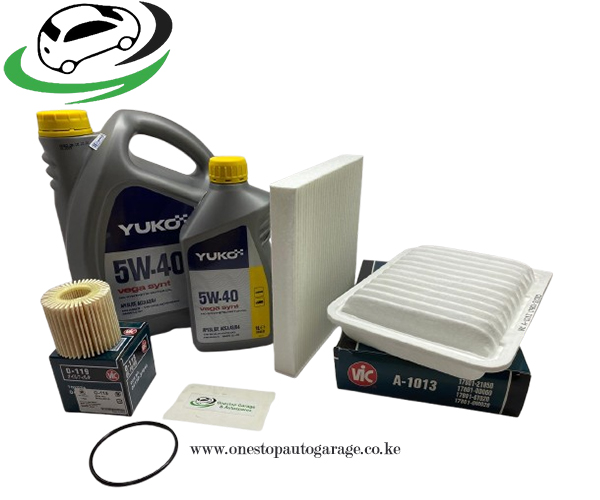-10%
Get Toyota Harrier ZSu60 Full Service Kit
Maintaining a vehicle in optimal working condition requires regular servicing to ensure that all components are functioning properly. A full service kit is a comprehensive package that contains all the essential parts and fluids needed for a thorough vehicle service. It typically includes items like oil filters, air filters, spark plugs, fuel filters, cabin filters, engine oil, and other critical components necessary to maintain engine performance, fuel efficiency, and safety. In this detailed explanation, we will delve into the components of a full service kit, the benefits of using such a kit, and the importance of adhering to regular service intervals for maintaining vehicle longevity and performance.
Components of a Full Service Kit
A full service kit contains a range of items that address various aspects of a vehicle’s mechanical and electrical systems. The exact contents can vary based on the vehicle make and model, but common components include:
1. Oil Filter
The oil filter is a crucial part of the engine’s lubrication system. It filters out contaminants, such as dirt and metal particles, from the engine oil, ensuring that only clean oil circulates through the engine. Over time, the oil filter becomes clogged with debris, reducing its effectiveness. Replacing the oil filter during a full service ensures that the engine continues to receive clean oil, reducing wear on moving parts and prolonging engine life.
2. Air Filter
The air filter prevents dust, dirt, and other contaminants from entering the engine’s combustion chamber. A clean air filter ensures optimal airflow, which is essential for proper fuel combustion and engine performance. A clogged air filter can lead to reduced engine efficiency, poor fuel economy, and increased emissions. Replacing the air filter during a full service helps the engine breathe easier, improving overall performance.
3. Fuel Filter
The fuel filter ensures that the fuel delivered to the engine is free of impurities. Over time, particles such as rust, dirt, and debris can accumulate in the fuel system, causing blockages and reducing engine performance. A dirty fuel filter can lead to starting problems, poor acceleration, and even engine damage. Replacing the fuel filter as part of the service kit ensures smooth fuel flow and optimal engine efficiency.
4. Cabin Air Filter
The cabin air filter cleans the air that enters the vehicle’s interior through the heating, ventilation, and air conditioning (HVAC) system. It filters out dust, pollen, and other allergens, providing a comfortable and healthy environment inside the vehicle. Over time, cabin filters can become clogged, reducing airflow and the efficiency of the HVAC system. Replacing the cabin air filter during a full service ensures that the vehicle’s occupants enjoy fresh, clean air.
6. Engine Oil
Engine oil lubricates the moving parts of the engine, reduces friction, and helps dissipate heat. Over time, engine oil degrades and becomes contaminated with particles, reducing its effectiveness. Regular oil changes are essential to ensure that the engine remains well-lubricated and protected from wear. Full service kits often include synthetic or semi-synthetic engine oils tailored to the specific vehicle’s requirements. Changing the oil during a service ensures the engine runs smoothly and efficiently.
8. Transmission Fluid
Transmission fluid is essential for lubricating the gears and ensuring smooth shifting in both manual and automatic transmissions. Over time, transmission fluid can break down, leading to poor gear shifts, overheating, and potential damage to the transmission system. Checking and replacing transmission fluid as part of a full service ensures that the vehicle’s transmission operates efficiently.
Benefits of a Full Service Kit
1. Comprehensive Maintenance
A full service kit provides all the components needed for a thorough inspection and replacement of essential vehicle parts. This ensures that all critical systems are addressed during the service, reducing the risk of overlooking any potential issues that could lead to breakdowns or costly repairs.
2. Cost-Effective Solution
Purchasing a full service kit is often more cost-effective than buying individual parts separately. The kit provides a complete set of components tailored to the vehicle’s specific needs, ensuring compatibility and reducing the risk of purchasing incorrect parts. It also simplifies the servicing process by having all necessary items on hand.
3. Improved Vehicle Performance
Regularly replacing components such as filters, spark plugs, and engine oil as part of a full service helps maintain peak vehicle performance. Clean air filters ensure proper airflow, new spark plugs provide efficient combustion, and fresh oil lubricates the engine, resulting in smoother operation, better fuel efficiency, and reduced emissions.
4. Extended Vehicle Lifespan
Routine maintenance using a full service kit can significantly extend the lifespan of a vehicle. Replacing worn or faulty components helps prevent major issues from developing, such as engine wear, transmission failure, or brake problems. This not only keeps the vehicle running efficiently but also increases its longevity and resale value.
5. Enhanced Safety
A full service kit often includes components that directly affect vehicle safety, such as brake pads, discs, and belts. Ensuring that these components are in good condition reduces the risk of accidents caused by faulty brakes, steering, or other critical systems. Regular servicing helps identify and address safety concerns before they become serious issues.
Importance of Regular Maintenance
Adhering to the vehicle manufacturer’s recommended service intervals is crucial for maintaining reliability and performance. A full service typically includes checks on essential systems such as the engine, transmission, brakes, suspension, and electrical components. Ignoring routine maintenance can lead to problems such as poor fuel economy, reduced engine performance, and even complete system failures.
Regular servicing also provides an opportunity to detect potential issues early on, allowing for timely repairs before they escalate into costly problems. For example, replacing a worn drive belt during a service can prevent the alternator or water pump from failing, avoiding more expensive repairs in the future.
Follow us on Facebook for more parts.



